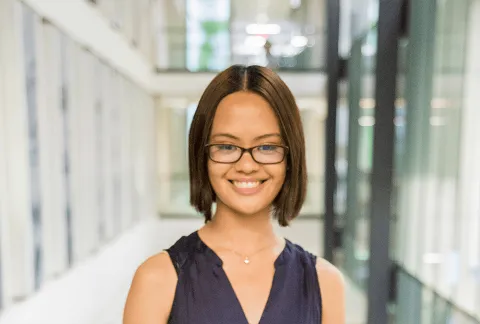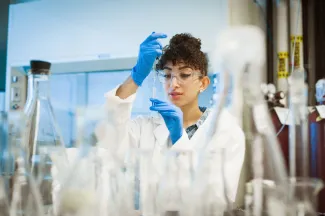"If you prefer solving problems and you’re interested in solving real-world applications, engineering could be for you."

Sharlene Santiago
- Degree:
- Bachelor of Applied Science
- Program:
- Campus: Vancouver
- Year: Final year (as of October 2023)
Why did you want to study engineering?
I started out in the Faculty of Science, and it was at the end of my second year in biochemistry that I decided I wanted to study engineering. Switching majors was one of the toughest decisions I‘ve made, but was also one of the best. I applied to engineering because I wasn’t feeling particularly engaged in my science classes. I had also talked with some academic advisors and learned that my job opportunities after graduating with a science major would likely be limited to lab tech positions unless I went on to grad school, which I wasn’t interested in doing. I realized that studying chemical and biological engineering was an option that would enable me to have a vast array of career options right after graduating while continuing to study something I love.
Chemical and Biological Engineering
Tell us about your co-op experience.
I’ve just completed my fifth and final co-op term and have done 20 months of co-op in total. I deliberately chose to work at four organizations (a different one for almost every co-op term) so that I could experience a diverse range of industries and company cultures. I learned a lot about myself in the process.
It was fantastic to get some hands-on experience in laboratory settings and a pilot plant.
However, my most recent co-op experience at a consulting firm was very rewarding – I liked the work-life balance and found the work to be diverse and interesting, with lots of opportunities to learn new things every day.

How about engineering design teams?
I’ve been part of several teams, including UBC Concrete Canoe, Sustaingineering UBC and the UBC Biomedical Engineering Student Team.
I think design teams are great for learning and meeting people, and particularly important for setting yourself apart from others when you are applying for co-op positions.
Everyone has taken the same courses, so if you can demonstrate technical project experience through your design team work, that will help you stand out.
UBC Concrete Canoe Sustaingineering UBC UBC Biomedical Engineering Student Team
Anything else you want to add?
Throughout my engineering classes there have been discussions about the importance of bringing different perspectives to the design process and the value of team diversity. I don’t think this is talked about as much in the Faculty of Science, but it is something I appreciate coming to this field given my gender and background.
If we’re designing for sustainability, it’s important to include multiple perspectives.




